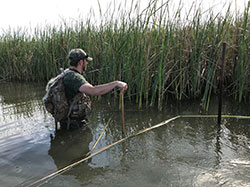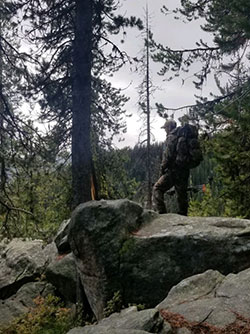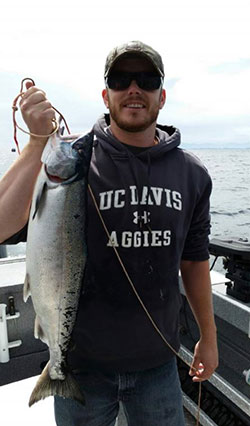
Carrothers in Merced County assessing habitat for signs of invasive nutria.

On an elk hunt in Idaho.

Salmon fishing in Juneau, Alaska.
Ryan Carrothers’ job requires him to wear many hats. As a CDFW wildlife biologist working in the Sacramento-San Joaquin Delta, one of his main roles is helping manage the Delta’s wildlife and ecological reserves. In this capacity, he makes himself available to the public to answer questions about hunting, wildlife viewing and other forms of recreation. Another part of his job is conducting surveys to assess how local wildlife populations are doing. When he’s not working on CDFW properties, you can find Carrothers helping Delta residents manage their interactions with wildlife, including issuing depredation permits and educating homeowners on what they can do to prevent damage to property caused by wildlife. Additionally, Carrothers facilitates CDFW hunting programs, including youth apprentice hunts. He was also among the first biologists to take a lead role in launching CDFW’s nutria program, which aims to eradicate the invasive rodent species from the state.
Carrothers graduated from the University of California, Davis, with a degree in wildlife, fish and conservation biology. In 2010, he was hired as a scientific aid for the game management program in CDFW’s Wildlife Branch. In 2012, he was hired for his current position as a unit biologist in the Delta.
What inspired you to become a scientist?
Growing up, both of my parents were wildlife biologists. My dad was a wildlife manager with the Arizona Game and Fish Department, and my mom worked for the U.S. Forest Service. I was raised out in the middle of the woods in the Tonto National Forest in Arizona. I spent a lot of time around wildlife, and I wanted to continue being out in the woods. I’ve pretty much been set on this path since I was a kid.
Early on in my career, when I was a scientific aid, I got to meet a lot of wildlife biologists and hear about their jobs. I liked how they were the go-to resource for a designated area, and how the job required them to be a jack-of-all-trades. They were involved with endangered species, hunting and many other important conservation issues. As soon as I learned about the unit biologist position, I knew it was a job I wanted.
What do you like most about your job?
I really lucked out because I wanted a job where I got to work hands-on with wildlife and have my own area of responsibility. In this job I get to provide knowledge to the hunting public, and I enjoy being the go-to person for the gamut of questions that come across my desk. I like answering phone calls from the public, especially from people who are visiting the Delta and really interested in learning. I love being able to give them the answers they’re looking for. There’s also a lot of variety in my job. One week I could be handling waterfowl hunts and taking part in wildlife surveys from a helicopter, and the next week I could be responding to a bear in an urban area or giving a presentation on sandhill cranes to a community organization.
I also enjoy facilitating hunting programs, especially the apprentice hunts. It’s great to see kids coming out for the first time and getting to bring home their first duck or pheasant. I like seeing the excitement and seeing how proud mom or dad is. The apprentice hunts are also an opportunity for me to explain the important role that hunting plays in conservation. What has been the most rewarding part of your job so far? I think it’s been the opportunity to learn the way the Delta operates and being able to work with the public and partner agencies on all kinds of issues. My wife and I live on the fringe of the Delta, so we’ve gotten to know it’s unique culture. Living here helps me serve the community in a professional capacity because I’m living the issues. I think it’s vital to have on-the-ground, local knowledge and people who are familiar with the habitat and stakeholders in a given area.
What has been the most surprising aspect of your job?
I knew that being a unit biologist would come with some level of public interaction, but I didn’t realize just how important communicating with people would be. I’m learning that having a career in wildlife isn’t just about managing wildlife. As a department, we have a responsibility to constantly inform and interact with our stakeholders, and to do that we have to communicate effectively.
What advice do you have for young people who are considering careers in science or natural resources?
First, take advantage of summers while you’re in college. Summers are your opportunity to work seasonal jobs in all sorts of cool places and get hands-on experience. It will help you discover which direction you want to go in your career. You might think you want to work in one area but find it’s not what you thought. Or you might try something new and find it’s your dream job. You won’t know until you get hands-on experience.
My second suggestion is to get comfortable with the idea of being uncomfortable. By that I mean you never know what you’ll end up doing as part of your job. You could be wearing waders in 100-degree weather all day, or you might have to wake up at 1 a.m. to staff a check station. Or you could be in freezing temperatures with wet boots tracking wildlife. Be OK with the idea that sometimes you’ll be in uncomfortable situations. I’ve had assignments that were less enjoyable than others, but at the end of the day they are some of my favorite memories.
What’s something people might be surprised to learn about you?
I’m red-green colorblind, and I think it makes me a better biologist! Identifying birds and other wildlife comes down to a lot more than just noticing certain colors. Recognizing movement, size and other features of wildlife are all important. Having color issues with my vision has allowed me to hone in on the other aspects of identification. I’ve also heard that folks like me are better at spotting deer through binoculars on a brushy hillside. I like to think that’s true!